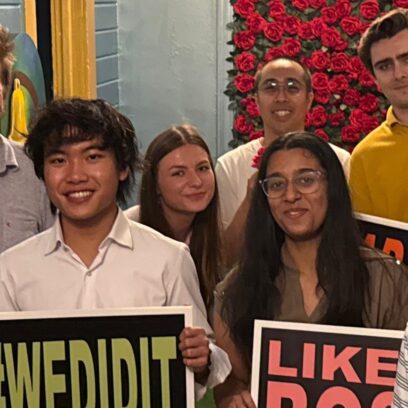What I Learned at Sustainable Brands 23 (SB’23) and VERGE 23

Reflecting on SB’23 and VERGE 23, I witnessed a widespread shift from conceptualizing climate change issues to implementing practical, actionable sustainability strategies in business.
Attending conferences always brings a mixed bag of emotions for me. It’s great to see familiar industry folks, to connect with lots of new companies and ideas, and to discuss what is on the horizon for sustainability, but logistics can be tricky and the time away from family is a commitment. I spent 7 of 10 working days in back to back weeks attending Sustainable Brands 23 (SB’23) and VERGE 23, and while this stint was a similar mix of complicated logistics and engaging interactions, upon reflection, it brought me squarely back to why I chose to work in sustainability and decarbonization along with the core values and beliefs we have for our Climate Services team here at CarbonBetter. It was encouraging and validating to have these things align with so many at these conferences.
At CarbonBetter, we believe that what’s good for the planet is good for business. At SB’23 there were hundreds of brands coming together in one place to collaboratively learn about and discuss how to take measured steps towards climate action and discuss best practices being used to do so. Hearing about Microsoft’s usage of biomimicry in site design or how Logitech has product level carbon intensity calculations on its package labeling showed innovation to incorporate sustainability into good business. At VERGE 23, the intersection of startups, climate tech, investors, carbon project developers, professional services, and corporations big and small were on full display as 5,000+ people came together to sort through all stages of climate solutions. The density of ideas, beliefs, and people coming together for these gatherings left me nothing short of amazed at how much business is focused on making businesses and the world more sustainable.
As we work with our clients, there is a particular focus on pragmatic solutions that deliver maximum impact. At these two conferences, there seemed to be an increased focus that extended beyond measuring environmental impacts, evaluating potential steps of decarbonization, and goal setting. A larger set of attendees than ever were discussing topics like how to break down communications and terms for applicability and resonance to get better engagement from key stakeholders, how to talk through ROI in a more meaningful way across functions, how to scale quality removals projects in the voluntary carbon market (VCM), and lengthy discussions were had regarding decarbonizing Scope 3 emissions. Insights ranged from The Cool Down about the impactfulness of appealing to self interest as opposed to broader statements about saving the planet to Cisco discussing how Power over Ethernet can be used as an alternative to traditional electric solutions were fascinating. In the midst of these conversations was a common effort to work towards viable solutions by listening to other perspectives. It felt like a strong step across the board from “how do we conceptualize the problem of climate change” to a more practical “how do we start getting something done.”
“At VERGE 23, the intersection of startups, climate tech, investors, carbon project developers, professional services, and corporations big and small were on full display as 5,000+ people came together to sort through all stages of climate solutions. The density of ideas, beliefs, and people coming together for these gatherings left me nothing short of amazed at how much business is focused on making businesses and the world more sustainable.”
Dominic Sung, former Director of Business Development
Skip the RFP—CarbonBetter can help
CarbonBetter Certified Offset Portfolios allow carbon buyers to participate in a variety of projects, geographies, and technologies in one simple transaction rather than navigating a lengthy and complex RFP process with multiple carbon market participants.
Learn More about CBCO 22-1I don’t know that there are appropriate words to describe the amount of nuance, complexity, and illiquidity that exists in the VCM today. Suffice it to say that it is a significant challenge to any participant in the market to navigate, and if you aren’t active on a regular basis, it is even more daunting of a task. Coming out of in depth conversations—with registries like the Climate Action Reserve (CAR) and the Verra Carbon Standard (VCS), major corporations like Google, Microsoft, and Cisco, carbon project developers, ratings entities like BeZero and Sylvera, and other market participants—about how to scale, the unique challenge to funding projects without access to debt, challenges to project quality, and the like, I am ever confident that CarbonBetter is uniquely able to help navigate the VCM.
As time passes, I am reminded of the importance and urgency with which we need to take climate action. These conferences are a microcosm of my personal journey. The challenges can be daunting, but the work is crucial and increasingly more important. The “why” pushes me to figure out “how.” In the whirlwind of two weeks of conferences and thousands of people gathering, I am energized to continue the work we do here at CarbonBetter, and I am greatly encouraged by all those rowing in the same direction.
We help businesses no matter where they are in their sustainability journey. If you’d like to learn more about how CarbonBetter can help your organization achieve its environmental goals and to meet any upcoming regulations, contact us today.
SB'23 and VERGE 23 reinforced that businesses need to incorporate sustainability at every level of the organization. We saw firsthand how leading companies are integrating sustainability into their core strategies, not just as a side project. This approach is crucial for long-term business resilience and success in today's environmentally conscious market.
At SB'23, Microsoft’s use of biomimicry in site design and Logitech’s carbon intensity labeling were standout examples of innovative sustainability integration. These practices show how sustainability can be a driver of innovation and value creation, rather than a compliance exercise.
The VCM is complex, but it's navigable with the right approach. Businesses need to focus on due diligence and select high-quality, impactful projects. Understanding the standards and certifications, like those from the Climate Action Reserve (CAR) or Verra, is key to making informed choices.
A major takeaway was the importance of clear, relatable communication in sustainability. It's about breaking down complex concepts into tangible impacts and stories that resonate with stakeholders, ensuring they understand the value and impact of these initiatives.
Businesses should start by assessing their current sustainability practices and setting clear, measurable goals. Staying informed about legislation and market trends is crucial. Integrating innovative practices and frameworks discussed at the conferences, tailored to your business's unique needs, will help in advancing your sustainability journey effectively.


